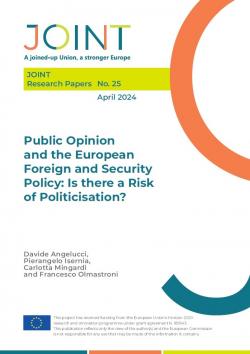Public Opinion and the European Foreign and Security Policy: Is there a Risk of Politicisation?
This paper explores the current state of contention in the European Common Foreign and Security Policy (CFSP) and the conditions that could lead to its politicisation. We start from the question about why there has been so little progress in foreign and defence policy integration despite the widespread support for it from both the public and political elites. We suggest that the reason for that is the existence of a “politicisation trap”, in which politicians are reluctant to scale Europeanisation up in these areas because they fear domestic opposition forces would instrumentalise the issue. Our research suggests that CFSP is exposed to politicisation from both extreme left and extreme right policy entrepreneurs. However, it also shows that the orientation of the public is more receptive to arguments than to ideological affiliations. The implication for public debate is pretty consequential: the ability to convey substantive elements in the public debate may well be the single most important factor in determining whether advocating for more foreign, security and defence policy integration can turn into a political win. In other words, the onus is on politicians and their ability to let the debate run in substantive ways.
-
Details
Rome, IAI, April 2024, 34 p. -
In:
-
Issue
JOINT Research Paper 25
1. Introduction: Is security and defence policy exposed to a politicisation trap?
2. What we know about the sources and characteristics of politicisation
3. Has foreign and security policy become more salient and more controversial in Europe?
3.1 Has EUFSP become more salient?
3.2 Has EUFSP become more controversial?
3.2.1 Political parties
3.2.2 Public opinion
4. Is politicisation looming large?
Conclusions
References



